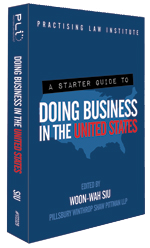 Image courtesy PLI.
Image courtesy PLI. A Starter Guide to Doing Business in the United States
$49.00
Edited by Woon-Wah Siu
293 pages
Lawyers have specialized libraries called law libraries, where you will find titles that are almost impossible to find elsewhere. One of these new books that I found especially useful at the Allegheny County Law Library is “A Starter Guide to Doing Business in the United States”. I have recommended this to two clients, who have similarly expressed their appreciation for this book.
A Starter Guide is one of those no-nonsense books that is clearly laid out and written by expert business attorneys from top firms who know what they're talking about. While nothing can replace good legal advice tailored towards the unique aspects of each client's business, clients (and lawyers who do not practice business law) are given a concise and well-written overview of almost all issues they are likely to face, or at least have questions about.
The comprehensiveness of the book is evident from the topics listed in its table of chapters, which address entity selection, federal securities laws, mergers and acquisitions, immigration law, real estate, intellectual property, environmental liability, product liability, and much, much more.
What I most appreciate about the book is its just-the-facts approach with a minimum of use of specialized legal terms and other information of secondary importance. It lacks substantive depth in exploring each topic (e.g. it gives an overview of virtually all the types of insurance a business may need to consider – property, worker's comp, general liability, excess/umbrella, business interruption, directors'/officers' liability, professional liability, pollution liability, health, and life insurance). However, such an overview in 293 condensed pages helps a client understand the framework through which an attorney considers their case, and prepares visits my clients for asking well-informed questions rather than waste time going over the very basics. For example, if a restaurant owner client comes in having already read this book, they will already know what types of insurance they will likely need, and why a landlord or a local governmental body might require them to carry such types of insurance.
While this book is ostensibly written for foreign individuals and entities seeking to do business in the United States, I highly recommend this book for anyone who wants to start a business in the United States.
$49.00
Edited by Woon-Wah Siu
293 pages
Lawyers have specialized libraries called law libraries, where you will find titles that are almost impossible to find elsewhere. One of these new books that I found especially useful at the Allegheny County Law Library is “A Starter Guide to Doing Business in the United States”. I have recommended this to two clients, who have similarly expressed their appreciation for this book.
A Starter Guide is one of those no-nonsense books that is clearly laid out and written by expert business attorneys from top firms who know what they're talking about. While nothing can replace good legal advice tailored towards the unique aspects of each client's business, clients (and lawyers who do not practice business law) are given a concise and well-written overview of almost all issues they are likely to face, or at least have questions about.
The comprehensiveness of the book is evident from the topics listed in its table of chapters, which address entity selection, federal securities laws, mergers and acquisitions, immigration law, real estate, intellectual property, environmental liability, product liability, and much, much more.
What I most appreciate about the book is its just-the-facts approach with a minimum of use of specialized legal terms and other information of secondary importance. It lacks substantive depth in exploring each topic (e.g. it gives an overview of virtually all the types of insurance a business may need to consider – property, worker's comp, general liability, excess/umbrella, business interruption, directors'/officers' liability, professional liability, pollution liability, health, and life insurance). However, such an overview in 293 condensed pages helps a client understand the framework through which an attorney considers their case, and prepares visits my clients for asking well-informed questions rather than waste time going over the very basics. For example, if a restaurant owner client comes in having already read this book, they will already know what types of insurance they will likely need, and why a landlord or a local governmental body might require them to carry such types of insurance.
While this book is ostensibly written for foreign individuals and entities seeking to do business in the United States, I highly recommend this book for anyone who wants to start a business in the United States.

 RSS Feed
RSS Feed
